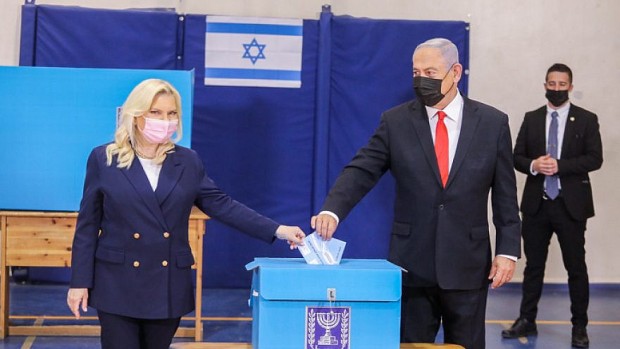Netanyahu has path to a majority and 6th term, exit polls show

JERUSALEM — Prime Minister Benjamin Netanyahu’s party held a lead in Israel’s fourth election in two years, exit polls projected Tuesday (23) night, giving him a chance of forming a coalition to stay in power for a sixth term.
Three broadcasters’ exit polls projected that Netanyahu’s party, Likud, won from 31 to 33 seats, while his wider right-wing bloc won 53 to 54 seats — short of the 61 seats he needs to form a majority coalition in the 120-seat Parliament.
Netanyahu’s most obvious path to power now depends on Naftali Bennett, a rival right-winger whose party won seven to eight seats and who could be a kingmaker.
With Bennett’s support, Netanyahu could assemble one of the most right-wing governments in Israeli history, created from ultra-Orthodox parties, ultranationalists, a group that campaigns against gay rights and another whose leader advocates expelling Arab citizens of Israel deemed disloyal to the state.
Final results are not expected until the end of the week and could easily change the outcome.
Netanyahu campaigned on his record of handling the coronavirus pandemic, including a vaccine rollout that is the envy of the world. Seeking re-election even as he was on trial on corruption charges, an unprecedented situation, did not prove fatal to his chances.
If he does return to power, Netanyahu has promised to enact sweeping legal reforms that would limit the power of the judiciary, and which his opponents fear would allow him to circumvent his corruption trial. Netanyahu’s colleagues have prevaricated in recent days about whether he would use his office to avoid prosecution, with one minister Saturday refusing to rule it out.
Netanyahu denies any wrongdoing and that he would try to change the law to derail the trial.
“Israelis are more divided than ever, but it seems that Netanyahu may have convinced enough of them that he’s the most capable of leading the country in facing the challenges ahead,” said Yohanan Plesner, president of the Israel Democracy Initiative, a Jerusalem-based research group.
The election caps two years of political uncertainty and polarization in which Israel has reeled from election to election to election, failing each time to return a stable government.
-New York Times

